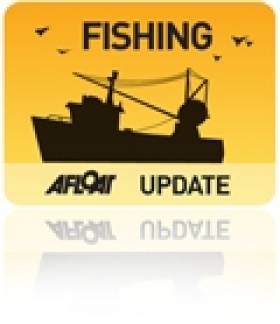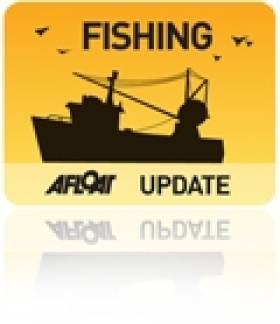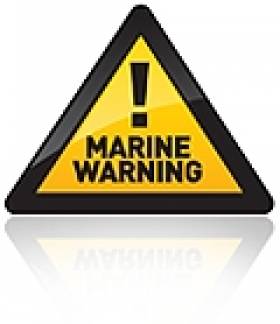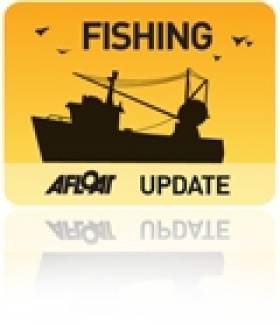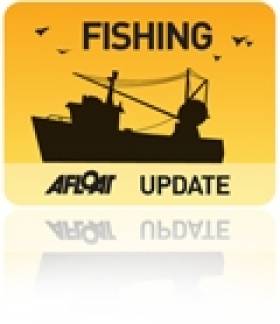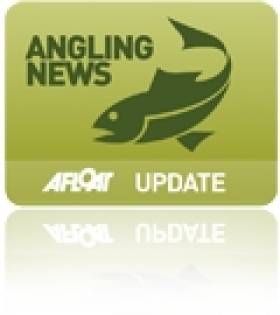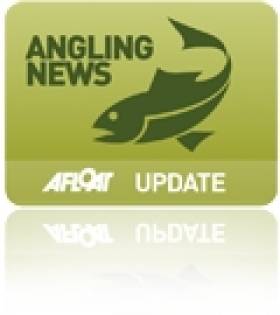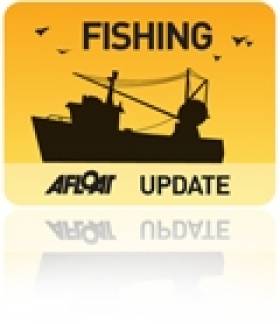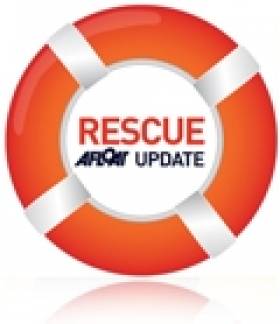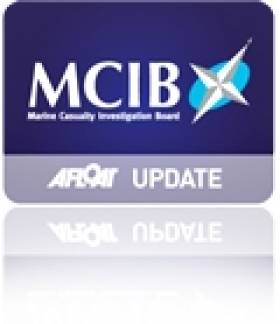Displaying items by tag: Fishing
The Marine Institute and BIM produced the "Discard Atlas" – which is a detailed compendium of discards by the Irish Fleet on a stock by stock and area by area basis. The Atlas also outlines a range of potential measures to help reduce discarding. The "Discard Atlas - scientific observations and potential solutions" was compiled with the support of Irish Industry, to inform the EU wide discard debate, to identify where action needs to be taken and to inform on the appropriate measures.
Commenting on the Atlas Minister Coveney said "Ireland has now taken the lead in the debate on discards and this Atlas will inform the process to achieve real change and a significant reduction in discarding within the new Common Fisheries Policy". Minister Coveney emphasised that "discarding is an EU wide issue, not just an Irish issue. While the Atlas highlights discarding in the Irish fleet, all Member States fishing these stocks, do so at the same time, using similar gears and under the same market conditions. While there may be some differences, overall the discard trends will be similar for all".
In calling for all Member States to publish their figures, the Minister said "I have consistently said that discarding is a complex issue and the debate must be informed by all the scientific facts, so we can better understand the issues and identify potential solutions". The information provided in the Atlas is based on information that is collected by all Member States. However, the international data has not been compiled into an Atlas format. Minister Coveney said " It is only when the full extent of the available international data are compiled can we collectively make informed decisions on a coherent EU wide discard policy, underpinned by a focussed suite of measures to significantly reduce and ultimately eliminate discards. The information contained in the Atlas re-enforces my long held view that we need to tackle the discard problem on a stock by stock and fishery by fishery basis, and not by a blunt simplistic blanket ban which will be difficult to enforce".
The Atlas states that in a review of world discarding, the UN noted that the northeast Atlantic has the second highest discard level in the world, estimated to be 1.3 million tonnes, the majority being attributed to EU fisheries. The extent of discarding varies and where international data are available, the picture is mixed. In the Celtic Sea, international discarding of haddock was 12,400 tonnes (56% by weight) in 2010. In the Irish Sea; an average discard rate of 30% for haddock associated with Irish vessels is in line with other countries. However, there are cases where Ireland makes a very minor contribution to overall international discarding; for example in 2010, 1,183t of Cod was discarded in the North West fishery (area Via), yet Ireland contributed to less than 1% of this.
Minister Coveney said that "I want to commend the Irish industry in their decision to support this project, and acknowledge that they have already been pro-active in bringing forward proposals to reduce discarding of, Cod, Haddock and Whiting in the Celtic Sea. I intend to build on this good work by asking the Irish Fisheries Science Research Partnership (IFSRP) to look at the matter in light of the new Atlas information and explore the possibility of coming forward with further ambitious discard mitigation measure. It is only by this type of cross industry co-operation that a comprehensive set of proposals for dealing with the EU wide discarding problem can be designed and implemented, and I call on other Member States to follow the Irish lead and publish the full details of their discards so that our common goal for the elimination of discards can be realised."
Fishing Vessel Skipper Pleads Guilty
On 3rd January 2011 the UK registered fishing vessel 'Karen' was returning from a day's fishing in the Irish Sea when it grounded on the rocks at the North entrance to the port of Ardglass.
The vessel asked for urgent assistance from the Coastguard and the lifeboat from Portaferry was requested to launch to their aid. Because the weather was fair they were able to bring the crew ashore to Ardglass and to put pumps aboard the stricken vessel. The boat was later re-floated as the tide rose, however it sustained serious damage to the bow and keel.
At the Magistrate's Court in Downpatrick on 7th November 2011, skipper Simon Wills pleaded guilty of failing to properly navigate his vessel and to employing crew who were not qualified and did not meet the requirements of the fishing vessel safety training regulations
Mr Wills was fined a total of £600 and ordered to pay £1,250 to the RNLI.
On summing up the Magistrate Brian Archer said,
"It was fortunate that no one was injured."
Captain Bill Bennett, Area Operations Manager (Survey and Inspection) Belfast, for the MCA stated that
"This was a serious breach of the fishing vessel safety training regulations and once again reminds all fishermen of the need to ensure everyone onboard is properly qualified and to safely navigate his vessel and to maintain a lookout at all times. All breaches of the Maritime Regulations are taken seriously by the Maritime and Coastguard Agency."
Campaign to Get Fishermen to Wear Lifejackets
Despite seven fishermen losing their lives at sea this year to date, a laissez-faire attitude to safety still exists in the industry, particularly in relation to the wearing of lifejackets. In an effort to get fishermen to take notice of the real danger of going to sea without wearing a lifejacket, Noel O'Sullivan, a fisherman from Castletownbere, Co. Cork will act as Ambassador for the campaign. Noel survived an accident at sea, along with his six crew, when his vessel 'Discovery' capsized off the Isles of Scilly on the 29th January, 2007.
Noel describes the day of the accident...'I will never forget that day. As we were hauling in the catch, I knew there was something wrong. She was listing dangerously and I instructed the crew to launch the life rafts and jump overboard. As we jumped, she listed violently and capsized onto one of the life-rafts - puncturing it.....I treaded the freezing water for more than two hours until we were rescued..... I was terrified going back fishing but I went back as it's my livelihood, it's what I know...the difference is, I am more aware of the dangers now and I insist all my crew wear lifejackets. I would appeal to all fishermen to do the same' (Hear Noel's full story on BIM's website, www.bim.ie.
The fatality rate for Ireland's fishing sector stands at 88 per 100,000, making it 48 times more hazardous than other occupations*. Wearing a suitable lifejacket is the single most effective measure a fisherman can take to increase the chance of survival if involved in a man-overboard accident at sea.
Jason Whooley, BIM's CEO appeals to the fishing industry: 'I am sincerely asking all fishermen to wear their lifejackets. It could be the difference between life and death, it is that simple. Despite being a legal requirement, it is not something that is taken seriously enough in the fishing sector. We aim, along with our partners, IWS and the RNLI, to change this mentality through a targeted and ongoing safety campaign and I am delighted that Noel, who has personally survived an accident at sea, is helping us to drive this important message home.'
Current RNLI statistics suggest that less than 35% of fishermen regularly wear a lifejacket. Many fishermen feel that wearing a jacket inhibits their mobility and makes working on deck much more difficult. Part of this awareness campaign will be highlighting that there are a growing range of lifejackets that fishermen can use to suit their method of fishing and skippers and crew have a responsibility to themselves, work colleagues and family to consider the available options. In fact, there are new lifejackets on the market that are extremely light and compact and would not interfere with work on deck at all.
Coveney Seeks British Support on Mackerel
The meeting took place in Luxembourg, where Minister Coveney is attending an EU Council of Agriculture & Fisheries' Ministers.
The Ministers discussed the ongoing mackerel negotiations in London, which are critical for their respective fishing industries, which together have the majority of the EU mackerel catch. Ministers agreed that the current unrestricted, irresponsible fishing of mackerel by Iceland and the Faroe Islands was totally unacceptable and would result, if continued at its current level, in the destruction of the stock.
The Ministers agreed to work together to secure an agreement on a fair share of Mackerel for Iceland and the Faroes. Minister Coveney said "I appreciate that serious efforts are underway to reach agreement on the share out of Mackerel, which is Ireland's most important fishery. I am very concerned that an agreement is not secured at a high cost as the share given to Iceland and the Faroes involves a reduction in Ireland's share. The share agreed, therefore, must be fair and proportionate. I welcome the outcome of today's meeting with my Ministerial counterparts to closely cooperate in the negotiations, in order to protect the interests of our fishing industry, which is dependent on a sustainably managed Mackerel stock."
Minister Coveney also said that the Ministers had agreed "to strongly demand trade sanctions, promised by Commissioner Damanaki, in the event that either Iceland or the Faroes are not prepared to stop their irresponsible fishing."
In addition to their discussions on the mackerel issue, the Ministers also discussed progress and their respective priorities on the reform of the CFP and the upcoming negotiations on TACs and quotas.
Bass Fishing Permit Refusal is Welcomed
Environmentalists have welcomed the decision by the Minister for the Marine to refuse a permit for commercial sea bass fishing in the Celtic Sea, The Irish Times reports.
The Friends of the Irish Environment hailed Minister Simon Coveney's retention of the total ban on commercial exploitation of sea bass stocks.
Anglers are only permitted to keep two of such fish measuring more than 40cm in any 24-hour period.
There has been much opposition to the proposal by the Federation of Irish Fishermen to lift the ban on commerical bass fishing.
The species has been on the protected list for more than 20 years but this protection was only made permanent in 2006.
Freeze on NI Fishing Licence Fees
Northern Ireland's sports minister has announced that there will be no increase in fishing licence fees for the 2012 angling seasons.
Carál Ní Chuilín said that "In light of the current economic climate, I have decided to keep the salmon and inland fishing licence fees at 2011 levels."
It marks the third year in a row that there has been no annual increase in fees for fishing licences.
The Minister added: "I hope this will continue to ease the financial burden on those involved in the commercial fishing sectors and encourage others to enjoy recreational fishing.”
The only changes for next year will be on fishing permits for the Public Angling Estate, which are subject to an inflationary rise of 4.8%.
The NI Department of Culture, Arts and Leisure says it is encouraging all fishermen and women to ensure that they have a rod licence and the correct permit to fish.
Those caught without the necessary documents will be reported with a view to prosecution, it says.
Fishing licences and permits are available to purchase online at www.nidirect.gov.uk/angling
New Fisheries Partnership for the River Shannon
The new group will comprise representatives from both bodies as well as Inland Fisheries Ireland, and will be independently chaired by former Shannon Fisheries Board CEO Eamon Cusack.
The plan is for anglers, fishery authorities and stakeholders to come together to assist in the management of the River Shannon.
At the group's launch in Athlone recently, Cusack said the partnership was working toward ensuring a sustainable yield of fish.
Crew Rescued from Sinking Fishing Boat off Donegal
The Irish registered 'Amy Jane' fishing vessel began taking in water about 13 miles off Malin Head this morning and was evacuated at 0945. The crew took to liferafts before being rescued. More details as we have it.
More from HM Coastguard
At 09.45am, Belfast Coastguard received a mayday call from a fishing vessel reporting that they were taking water and sinking.
The six crew of the fishing vessel took to their liferaft, dressed in their survival suits and took with them their EPIRB (Emergency Position Indicating Radio Beacon) which they had activated and a handheld VHF Radio.
Belfast Coastguard working with Malin Head Coastguard who had direct communications with the liferaft initiated a search and rescue mission to rescue the men.
The Irish Coastguard helicopter Rescue 118 based at Sligo was requested and was the Coastguard Helicopter Rescue 100 based at Stornoway.
The RNLI lifeboats from Portrush and Lough Swilly were also requested to launch.
The fishing Amy Jane SO876 registered in Sligo was 13 miles north of Malin Head when it made the mayday call.
The weather was reported as being North Westerly, Force 6 with a moderate swell.
Coleraine Coastguard rescue team are at City of Derry airport to receive the survivors.
Steve Carson, Watch Manager, Belfast Coastguard said:
We are pleased that this has been a successful rescue of six fishermen.
Sea Survival training which is undertaken by crew of fishing vessels and being properly equipped is a key factor in the rescue of these six men today.
Lost Irish Fishermen Found Safe and Sound Off Minehead
FOUR Irish fishermen reported missing on Sunday have been found in good spirits off the coast of Minehead in Somerset.
This Is The West Country reports that the four men had left Helvick harbour in Co Waterford early on Sunday on a fishing trip but got lost shortly thereafter.
After contacting the coastguard with their concerns, the Helvick Head RNLI lifeboat was dispatched to Minehead, where the lost boat had been found by another fishing vessel, Faoilean Ban.
The lost fishermen subseqently followed the Faoilean Ban back to port at Helvick.
MCIB Report on Sinking of Fishing Vessel 'Ainmire'
A breach in the engine compartment caused the fishing vessel Ainmire to take on water and sink off the coast of Scotland in April last year, according to the official report into the incident.
All crew on board the vessel were transferred safetly to another fishing boat that responded to its distress call, some 30 miles northwest of the Butt of Lewis on the morning of 29 April 2010.
The Marine Casualty Investigation Board (MCIB) report concluded that the failure of a sea water cooling pipe in the engine room was the most likely cause of the flooding, and pointed to the fact that the pipework had not been renewed during the life of the vessel.
It was also noted that the bilge pump and its motors were located under the floor plates in the engine room, and thus were inoperable when the water level had risen in the compartment.
In addition, the MCIB report found that the Ainmire has been operating without a Fishing Vessel Safety Certificate for more than six months at the time of the incident.
Though the owner had submitted a survey application and paid the required fee to the Marine Survey Office (MSO) the previous summer, a communication breakdown resulted in the required survey not being carried out before the expiration of the vessel's previous certification.
The MCIB advised boat owners and operators to be extra vigilant regarding the location of bilge pumps in their vessels.
It also warned that survey applications for certification "may not accommodate all situations", and that the issuing of a recepit is not a guarantee that an application is being dealt with.
The full report is available to download as a PDF from the MCIB website HERE.


























